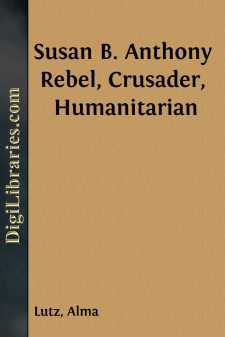Categories
- Antiques & Collectibles 13
- Architecture 36
- Art 48
- Bibles 22
- Biography & Autobiography 813
- Body, Mind & Spirit 142
- Business & Economics 28
- Children's Books 15
- Children's Fiction 12
- Computers 4
- Cooking 94
- Crafts & Hobbies 4
- Drama 346
- Education 46
- Family & Relationships 57
- Fiction 11828
- Games 19
- Gardening 17
- Health & Fitness 34
- History 1377
- House & Home 1
- Humor 147
- Juvenile Fiction 1873
- Juvenile Nonfiction 202
- Language Arts & Disciplines 88
- Law 16
- Literary Collections 686
- Literary Criticism 179
- Mathematics 13
- Medical 41
- Music 40
- Nature 179
- Non-Classifiable 1768
- Performing Arts 7
- Periodicals 1453
- Philosophy 64
- Photography 2
- Poetry 896
- Political Science 203
- Psychology 42
- Reference 154
- Religion 513
- Science 126
- Self-Help 84
- Social Science 81
- Sports & Recreation 34
- Study Aids 3
- Technology & Engineering 59
- Transportation 23
- Travel 463
- True Crime 29
Susan B. Anthony Rebel, Crusader, Humanitarian
by: Alma Lutz
Categories:
Description:
Excerpt
PREFACE
To strive for liberty and for a democratic way of life has always been a noble tradition of our country. Susan B. Anthony followed this tradition. Convinced that the principle of equal rights for all, as stated in the Declaration of Independence, must be expressed in the laws of a true republic, she devoted her life to the establishment of this ideal.
Because she recognized in Negro slavery and in the legal bondage of women flagrant violations of this principle, she became an active, courageous, effective antislavery crusader and a champion of civil and political rights for women. She saw women's struggle for freedom from legal restrictions as an important phase in the development of American democracy. To her this struggle was never a battle of the sexes, but a battle such as any freedom-loving people would wage for civil and political rights.
While her goals for women were only partially realized in her lifetime, she prepared the soil for the acceptance not only of her long-hoped-for federal woman suffrage amendment but for a worldwide recognition of human rights, now expressed in the United Nations Charter and the Declaration of Human Rights. She looked forward to the time when throughout the world there would be no discrimination because of race, color, religion, or sex.
"The letters of a person ...," said Thomas Jefferson, "form the only full and genuine journal of his life." Susan B. Anthony's letters, hundreds of them, preserved in libraries and private collections, and her diaries have been the basis of this biography, and I acknowledge my indebtedness to the following libraries and their helpful librarians: the American Antiquarian Society; the Bancroft Library of the University of California; the Boston Public Library; the Henry E. Huntington Library and Art Gallery; the Indiana State Library; the Kansas Historical Society; the Library of Congress; the Susan B. Anthony Memorial Collection of the Los Angeles Public Library, which has been transferred to the Henry E. Huntington Library; the New York Public Library; the New York State Library; the Ohio State Library; the Radcliffe Women's Archives; the Seneca Falls Historical Society; the Smith College Library; the Susan B. Anthony Memorial Inc., Rochester, New York; the University of Rochester Library; the University of Kentucky Library; and the Vassar College Library.
I am particularly indebted to Lucy E. Anthony, who asked me to write a biography of her aunt, lent me her aunt's diaries, and was most generous with her records and personal recollections. To her and to her sister, Mrs. Ann Anthony Bacon, I am very grateful for photographs and for permission to quote from Susan B. Anthony's diaries and from her letters and manuscripts.
Ida Husted Harper's Life and Work of Susan B. Anthony, written in collaboration with Susan B. Anthony, and the History of Woman Suffrage, compiled by Elizabeth Cady Stanton, Susan B. Anthony, Matilda Joslyn Gage, and Ida Husted Harper, have been invaluable. As many of the letters and documents used in the preparation of these books were destroyed, they have preserved an important record of the work of Susan B. Anthony and of the woman's rights movement.
I am especially grateful to Martha Taylor Howard for her unfailing interest and for the use of the valuable Susan B. Anthony Memorial Collection which she initiated and developed in Rochester, New York; and to Una R. Winter for her interest and for the use of her Susan B. Anthony Collection, most of which is now in the Henry E. Huntington Library.
I thank Edna M. Stantial for permission to examine and quote from the Blackwell Papers; Anna Dann Mason for permission to read her reminiscences and the many letters written to her by Susan B. Anthony; Ellen Garrison for permission to quote from letters of Lucretia Mott and Martha C. Wright; Eleanor W. Thompson for copies of Susan B. Anthony's letters to Amelia Bloomer; Henry R. Selden II whose grandfather was Susan B. Anthony's lawyer during her trial for voting; Judge John Van Voorhis whose grandfather was associated with Judge Selden in Miss Anthony's defense; William B. Brown for information about the early history of Adams, Massachusetts, the Susan B. Anthony birthplace, and the Friends Meeting House in Adams; Dr. James Harvey Young for information about Anna E....


